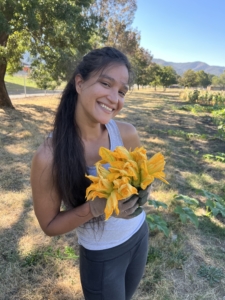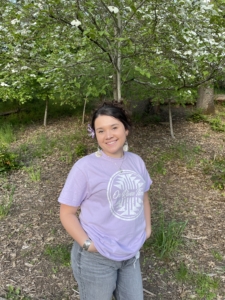SOU Native American Studies receives grant from Banyan Botanicals
(Ashland, Ore.) — Dragonfly’s Garden, located in Southern Oregon University’s community garden and a project of the Native American Studies Program, has been awarded a grant for $3,000 from Banyan Botanicals – a product and lifestyle company that focuses on the Ayurvedic alternative medicine system that is common in India and Nepal. Banyan Botanicals’ mission is to help people achieve health and well-being.
 The NAS program will use the grant from Banyan to hire SOU alumna T Tschantre, who is of Tewa descent, to support participation in growth of Dragonfly’s Garden and to tend the plot with student intern Alanis Baldy, a citizen of the Hoopa Valley Tribe.
The NAS program will use the grant from Banyan to hire SOU alumna T Tschantre, who is of Tewa descent, to support participation in growth of Dragonfly’s Garden and to tend the plot with student intern Alanis Baldy, a citizen of the Hoopa Valley Tribe.
“Students in the Native American Studies Program at Southern Oregon University are deeply committed to sustainable food systems, cultivation of Indigenous first foods and food sovereignty,” said Brook Colley, Ph.D., chair of the NAS program.
“Many have limited opportunities to grow their food and to practice the cultivation of culturally important medicinal plants,” she said, “However, this garden gives students a safe place to learn these skills and be supported in their exploration and learning.”
NAS students attempted to start a student garden project for many years, but were plagued by challenges including a lack of resources to pay student workers, the COVID-19 pandemic and catastrophic Rogue Valley wildfires.
SOU junior Amanda Rose enrolled in Colley’s spring 2021 Native American Ecological Knowledge course, in which she learned about “three sisters” gardening – a system of companion planting in which three plants are grown symbiotically. She and seven other students initiated a group project using the dynamic polyculture system at The Farm at SOU, and ultimately harvested more than 200 ears of sweet corn and 200 squash, of four varieties. The produce was shared with the NAS program, Native students and local Native community members.
 Baldy and other NAS students were inspired by the success of Rose’s three sisters garden, and mobilized to use the technique on a garden plot – which would become known as Dragonfly’s Garden – in the SOU Community Garden. The community garden is a student-run organic cooperative at the corner of South Mountain Avenue and Henry Street.
Baldy and other NAS students were inspired by the success of Rose’s three sisters garden, and mobilized to use the technique on a garden plot – which would become known as Dragonfly’s Garden – in the SOU Community Garden. The community garden is a student-run organic cooperative at the corner of South Mountain Avenue and Henry Street.
“Dragonfly’s Garden helps keep me connected to my culture and allows me to accomplish my goal of giving back to Indigenous communities,” said Baldy, who grew up on her tribe’s reservation in northern California – a culturally enriched environment that taught her of responsibilities to the land.
Tschantre considers the grant-supported role at the garden to be a means of using knowledge to be of service to the community. Tschantre, reconnecting with Native roots, said that learning about Native first foods, plants and land restoration is an important part of a personal journey.
“I’m interested in learning how to use methods of companion planting to create healthy habitats using herbs, flowers and vegetables in other annual and perennial gardens,” Tschantre said.
Dragonfly’s Garden is now dedicated to growing student knowledge of Indigenous first foods and companion planting. Students have learned that the system improves pollination, controls pests, provides a habitat for beneficial insects and improves harvests.
“We are very thankful to Banyan Botanicals and our other partners who support these cultural and educational efforts.” said Colley, the NAS chair.
Additional support for Dragonfly’s Garden and the three sisters garden has come from Siskiyou Seeds, which donated seeds for both gardens, and the Traditional Ecological Inquiry Program, which provided camas bulbs, wild onion bulbs and bitterroot for the project. Donations to support Dragonfly’s Garden and other projects of the SOU Native American Studies program can be made online.
-SOU-



